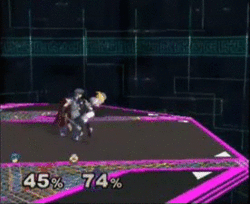Pivoting: Difference between revisions
m (split across sections) |
|||
| (52 intermediate revisions by 39 users not shown) | |||
| Line 1: | Line 1: | ||
{{ArticleIcons|ssb=y|ssbm=y|ssb4 | {{ArticleIcons|ssb=y|ssbm=y|ssbb=y|ssb4=y}} | ||
[[File:Marth pivot fsmash.gif|thumb|250px|{{SSBM|Marth}} pivoting a forward smash in ''Melee''.]] | [[File:Marth pivot fsmash.gif|thumb|250px|{{SSBM|Marth}} pivoting a forward smash in ''Melee''.]] | ||
{{Incomplete|Missing pivot distances for all characters in all applicable games.}} | |||
'''Pivoting''' is a technique that cancels an initial [[dash]] into the standing animation, to use any attack or other options out of a dash. | |||
The | Pivots are performed by dashing, and during the [[dashdance]] window, flicking the stick backwards for 1 frame (except in the original ''[[Super Smash Bros.]]'', where the stick can be flicked for up to 3 or 5 frames) and letting it reset to neutral on the next. The stick does not have to be "flicked" if the pivot is immediately cancelled into an attack, such as forward smash. Pivots that are not immediately cancelled into actions are called '''empty pivots'''. | ||
By being able to use an attack right after a quick burst of movement in either direction, pivoting is a useful technique for catching approaching opponents with a retreating attack, positioning oneself to catch someone's option during a techchase (pictured), or performing combos not possible otherwise, such as {{SSBM|Marth}}'s forward throw into forward smash on {{SSBM|Jigglypuff}}. | |||
{{ | |||
Pivots are easier to perform in ''SSB64'' than any other game, which makes them a more versatile part of the metagame as they are able to easily be used for raw movement. | |||
==In ''[[Super Smash Bros.]]''== | |||
[[File:SSB Falcon Pivot Ledgegrab.gif|thumb|250px|{{SSB|Captain Falcon}} performing a pivot ledgegrab.]] | |||
When dashing back during the [[dashdance]] window, there's a small turn state, treated as a stand state, that takes place before the dashback. Continuing to hold the dash input throughout the turn state will proceed into a backdash, but releasing the joystick to neutral before the dashback cancels into a regular standing state instead, and any action (such as jabs, grabs, tilts or smashes) can be taken immediately. This cancel out of the dash is the pivot, and the turn state is effectively the pivot window. Additionally, the turn state itself can be immediately cancelled into any action. | |||
In ''SSB64'' the pivot window is 5 frames for all characters, except {{SSB|Samus}} and {{SSB|Captain Falcon}}, who uniquely have a 3 frame window. Because of this leniency, pivots are a ubiquitous movement and spacing option for all characters, and also the major way to use tilt attacks, forward/down smashes, and down specials out of a dash. A prime example of this is with {{SSB|Kirby}}, where pivoting is used to fully exploit his {{mvsub|Kirby|SSB|up tilt}}. Captain Falcon, and to an extent other characters, can also make use of pivots in combos, such as comboing a forward throw into a pivot {{mvsub|Captain Falcon|SSB|up aerial}} resulting in low percentage kills due to how powerful the [[semi-spike]] hitbox is. | |||
Additionally, pivoting off platforms makes it possible for characters to grab the ledge and proceed to edgeguard. This is known as a '''pivot ledgegrab''', and is especially useful for Captain Falcon and {{SSB|Fox}} due to their long dash animations and fast falling speeds. | |||
==In ''[[Super Smash Bros. Melee]]''== | |||
Starting in ''Melee'' the pivot window was reduced to only 1 frame, which was likely done to make the game faster and more responsive. This change makes dashdancing faster and more useful than in ''SSB64'', but makes pivots harder to perform for raw movement. They see the most use when the pivot is immediately cancelled into an attacks, such as [[pivot grab]]s and pivot f-smash, which are typically faster than using the same moves out of a raw dash or [[wavedash]]. | |||
==In ''[[Super Smash Bros. Brawl]]''== | |||
In ''Brawl'' the dashdance window was reduced, making pivots cover less distance and less effective overall, though using tilts out of a pivot is easier due to being able to set the [[C-stick]] to tilts. Pivot grabs were made effectively a separate mechanic due to being available at any point of the run, even when true pivots aren't possible. | |||
==In ''[[Super Smash Bros. 4]]''== | |||
Pivots in ''SSB4'' work similarly to how they do in ''Brawl'', but uniquely keep more momentum from the dash. This causes sliding pivots, called '''perfect pivots''', that are compared to wavedashing by {{Sm|Izaw}}. This makes it a strong quick burst of movement despite the small dashdance window lowering the variance in distance, and many attacks keep the momentum of the perfect pivot. | |||
==In ''[[Super Smash Bros. Ultimate]]''== | |||
Pivots were removed in ''Ultimate'' as a result of the overhauled dash system. Pivot grabs still exist as a separate mechanic. | |||
==Resources== | |||
*[https://dignitas.gg/articles/blogs/smash/12051/implementing-pivots-in-melee In-depth explanation of pivoting by {{Sm|Rishi}}] | |||
*[https://www.youtube.com/watch?v=J_aqH9sJnbU Pivoting in Melee by {{Sm|PewPewU}}] | |||
*[https://www.youtube.com/watch?v=JIMzY1UdyTo a demonstration of pivoting in smash 64] | |||
*[https://youtu.be/zJ_ZzAvSFis?si=Y8Qg8yUO2dkiT6_6 Izaw's video on ''SSB4'''s perfect pivot] | |||
[[Category:Techniques (SSB)]] | |||
[[Category:Techniques (SSBM)]] | [[Category:Techniques (SSBM)]] | ||
[[Category:Techniques ( | [[Category:Techniques (SSBB)]] | ||
[[Category:Techniques (SSB4 | [[Category:Techniques (SSB4)]] | ||
[[Category:Advanced | [[Category:Advanced techniques]] | ||
[[Category:Unofficial lingo]] | |||
Latest revision as of 14:06, February 12, 2024

Pivoting is a technique that cancels an initial dash into the standing animation, to use any attack or other options out of a dash.
Pivots are performed by dashing, and during the dashdance window, flicking the stick backwards for 1 frame (except in the original Super Smash Bros., where the stick can be flicked for up to 3 or 5 frames) and letting it reset to neutral on the next. The stick does not have to be "flicked" if the pivot is immediately cancelled into an attack, such as forward smash. Pivots that are not immediately cancelled into actions are called empty pivots.
By being able to use an attack right after a quick burst of movement in either direction, pivoting is a useful technique for catching approaching opponents with a retreating attack, positioning oneself to catch someone's option during a techchase (pictured), or performing combos not possible otherwise, such as Marth's forward throw into forward smash on Jigglypuff.
Pivots are easier to perform in SSB64 than any other game, which makes them a more versatile part of the metagame as they are able to easily be used for raw movement.
In Super Smash Bros.[edit]

When dashing back during the dashdance window, there's a small turn state, treated as a stand state, that takes place before the dashback. Continuing to hold the dash input throughout the turn state will proceed into a backdash, but releasing the joystick to neutral before the dashback cancels into a regular standing state instead, and any action (such as jabs, grabs, tilts or smashes) can be taken immediately. This cancel out of the dash is the pivot, and the turn state is effectively the pivot window. Additionally, the turn state itself can be immediately cancelled into any action.
In SSB64 the pivot window is 5 frames for all characters, except Samus and Captain Falcon, who uniquely have a 3 frame window. Because of this leniency, pivots are a ubiquitous movement and spacing option for all characters, and also the major way to use tilt attacks, forward/down smashes, and down specials out of a dash. A prime example of this is with Kirby, where pivoting is used to fully exploit his up tilt. Captain Falcon, and to an extent other characters, can also make use of pivots in combos, such as comboing a forward throw into a pivot up aerial resulting in low percentage kills due to how powerful the semi-spike hitbox is.
Additionally, pivoting off platforms makes it possible for characters to grab the ledge and proceed to edgeguard. This is known as a pivot ledgegrab, and is especially useful for Captain Falcon and Fox due to their long dash animations and fast falling speeds.
In Super Smash Bros. Melee[edit]
Starting in Melee the pivot window was reduced to only 1 frame, which was likely done to make the game faster and more responsive. This change makes dashdancing faster and more useful than in SSB64, but makes pivots harder to perform for raw movement. They see the most use when the pivot is immediately cancelled into an attacks, such as pivot grabs and pivot f-smash, which are typically faster than using the same moves out of a raw dash or wavedash.
In Super Smash Bros. Brawl[edit]
In Brawl the dashdance window was reduced, making pivots cover less distance and less effective overall, though using tilts out of a pivot is easier due to being able to set the C-stick to tilts. Pivot grabs were made effectively a separate mechanic due to being available at any point of the run, even when true pivots aren't possible.
In Super Smash Bros. 4[edit]
Pivots in SSB4 work similarly to how they do in Brawl, but uniquely keep more momentum from the dash. This causes sliding pivots, called perfect pivots, that are compared to wavedashing by Izaw. This makes it a strong quick burst of movement despite the small dashdance window lowering the variance in distance, and many attacks keep the momentum of the perfect pivot.
In Super Smash Bros. Ultimate[edit]
Pivots were removed in Ultimate as a result of the overhauled dash system. Pivot grabs still exist as a separate mechanic.
